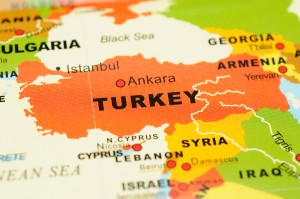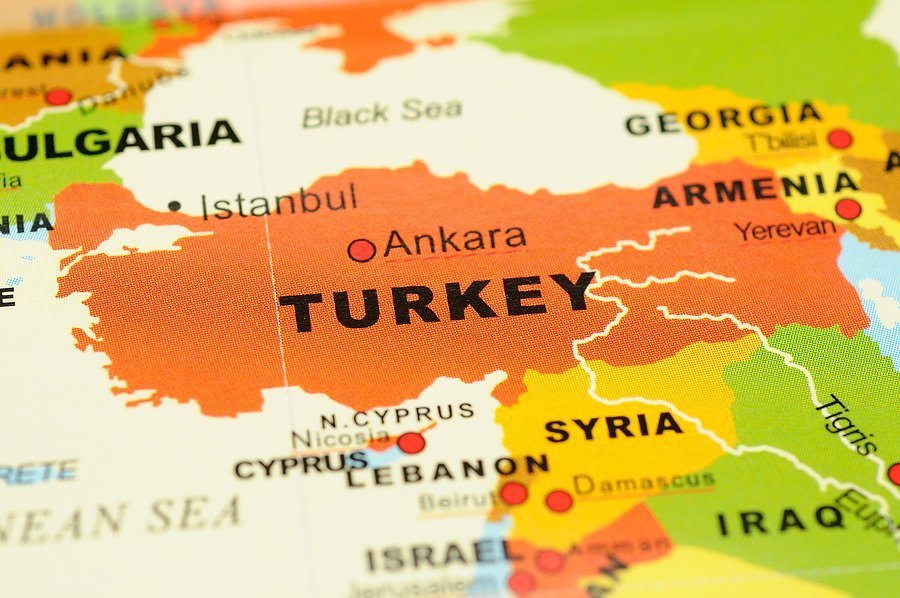2012-07-11 By Richard Weitz
The preoccupation with the current Turkey-Syria crisis needs to be placed in context of the evolving global situation.
With much of Europe paralyzed due to the Euro crisis, and with U.S. attention drifting eastward, Turkey has the opportunity to emerge as one of NATO’s new leaders.
This could happen if Ankara is able to adopt more of a collective transatlantic perspective and stops trying to import its bilateral disputes with Israel and the European Union into the alliance’s multinational deliberations.
Turkey brings important assets to NATO.
It has one of the world’s most dynamic economies, whose rapid growth is facilitating the modernization of the Turkish armed forces and the country’s domestic defense industry. Its large, predominately moderate Muslim population provides Ankara with one of the largest and most readily deployable armies in Europe.
Turkey’s location astride multiple global hotspots—the Balkans, the Caucasus, the Middle East, etc.–provides NATO with the geographically broad perspective of its national security community.
Turkey is also applying these assets to make major contributions to NATO and to many key NATO missions. More than one thousand Turkish soldiers serve in the International Security Assistance Force (ISAF) in Afghanistan. Turkish diplomats also have been pursuing regional peace initiatives such as the Istanbul Process aimed at reconciling Istanbul and Kabul. Ankara is well situated to mediate any peace agreement between the Afghan government and the Taliban insurgents.

Turkey has agreed to host a U.S. AN/TPY-2 missile defense early warning radar at Malatya, southeast of Ankara, as part of NATO efforts to defend against Iran’s growing missile capabilities.
Turkey also is one of the few NATO countries that sustains NATO’s nuclear sharing arrangement by hosting what is thought to be the largest number of U.S. nuclear weapons in Europe. Turkish warships are supporting important NATO maritime security operations and goals.
For years, Turkish warships have been helping patrol the Black Sea and eastern Mediterranean against terrorists and other threats to these vital lifelines. Turkey’s relative importance will rise under NATO’s new Military Command Structure, which leaves Turkey with one of the few major NATO headquarters on its soil. Ankara has been one of the most prominent drivers of NATO’s membership enlargement since the new entrants are often located near Turkey, so enlargement promotes stability in Turkey’s neighborhood.
Turkey is playing a crucial role in promoting NATO’s energy security by serving as a vital conduit for oil and gas reaching Europe from Eurasia, especially the Caspian basin and Russia.
A few days ago Turkey and Azerbaijan agreed to construct a $7 billion trans-Anatolian natural-gas pipeline, which will bring Azerbaijani gas to European markets without passing through Russian or Iranian territory. Even so, Russia no longer fears Ankara’s influence in Central Asia and might even welcome a Turkish presence to help counterbalance China’s growing presence in the region.
Turkey is now leading efforts to spread democracy and security in the Middle East, which has boosted its popularity in that region. Although neither Turkey nor NATO is eager for the alliance to become involved in Syria’s civil war, if NATO were to intervene militarily in Syria, it would probably do so from Turkish territory.
Turkey and NATO have been aligning their policies toward Syria throughout the crisis in the region.
When the Arab Spring unrest spread to Syria in March 2010, Turkey and NATO first sought to induce the Bashar al-Assad Assad regime to introduce the reforms demanded by the moderate protesters. But after Assad ignored their advice, and offered only fig leaf reforms designed to divide the opposition and perhaps win some foreign support, NATO and Ankara broke with Assad and demanded his removal. They have both since imposed various sanctions on his regime.
Although Turkey and NATO have followed similar paths regarding Syria, the journey has proven far costlier to Turkey.
Bilateral trade between Turkey and Syria reached $2.5 billion in 2010, making Turkey Syria’s largest trading partner, but has since collapsed, as have various Turkish visions of establishing a free trade agreement, a customs union, or other region-wide economic structures. Turkey’s “zero-problems” policy toward neighbors has also been negated. Other NATO governments had few economic or diplomatic ties with Assad’s regime, so have lost little in calling for his removal or by imposing sanctions on his country.
Following the downing of its reconnaissance plane, the Turkish government decided to invoke Article 4 in the North Atlantic Treaty, which provides for urgent consultations if a member considers its security interests threatened.
Despite some European worries about giving Ankara a blank check to escalate its confrontation with Syria, Turkey secured a very favorable NATO statement at a June 26 North Atlantic Council meeting. It condemned Syria’s action, expressed strong support for Turkey, and said NATO would closely monitor the situation on its eastern frontier. The declaration could help prevent a Russia-Turkey clash over Syria; the reconnaissance plane may have been monitoring Russian arms deliveries at the nearby Syrian port of Tartus, while the Russian military advisers in Syria may have had a hand in the shootdown decision.
In any case, Turkey has reinforced its border with Syria and the Turkish government has given the Turkish armed forces more flexible rules of engagement to respond to potential threats from Syrian forces approaching the Turkish border.
Turkey prudently did not invoke Article 5, which calls for collective defensive actions to counter threats, because there is not a consensus yet within the alliance to use force against Syria. And Turkey is unwilling to employ force unilaterally in Syria without some authoritative regional organization backing it.
The Arab League might eventually produce a suitable legitimizing document, since Qatar, Saudi Arabia, and other front-line states are eager to end the violence as well as the regime, but some of its members such as Algeria still oppose using military force against Syria. The Turkish military could easily defeat the Syrian military, but then Ankara could find it hard to extract its forces from their new military occupation duties.
The refugee issue is pressing Turkey to act sooner rather than later.
Already tens of thousands of Syrian refugees have fled to Turkey. Since both countries share a 500-mile border, the flow of Syrian refugees into Turkey will continue commensurate with the scale of the violence in northern Syria. Turkish authorities fear that the Syrian crackdown will lead to mass refugee exodus on the same magnitude as the one that followed the 1988 Enfal operation in Iraq. The continuation of the Syrian fighting, which has already spread to parts of Lebanon, also risks provoking a wider sectarian war that will hurt Turkey even if its troops refrain from directly intervening in Syria.
Turkish officials are now considering whether to establish a border buffer zone inside Syrian territory where refugees could relocate without entering Turkish territory.
Turkey created a similar zone in northern Iraq in 1991, which allowed more than a million Iraqi Kurds to escape Saddam Hussein’s expected retribution for their failed 1991 uprising after the Kuwait war. Ankara and Brussels could also apply the model used in Iraq and the former Yugoslavia in the 1990s and create no-fly zones, safe havens, and humanitarian corridors to protect Syrian civilians and accelerate the disintegration of Syrian army by enticing more military defectors. But the lesson of the 1990s is that, unless backed by air strikes and robust ground forces, the adversary will not respect these protection instruments.
The Syrian regime is not without other means of retaliation.
In addition to shooting at Turkish planes, Syrian forces have fired at Syrians fleeing across the border into Turkey. For example, Damascus could renew support for the Partiya Karkeren Kurdistan (PKK, Kurdistan Workers Party), which includes many members who were born or based in Syria.
One hopes that people in Ankara and Brussels are developing plans for what might happen should the regime in Damascus retaliate, resign, or collapse. Even if the regime in Damascus falls, the result is less likely to be a gentle transition to a liberal democracy, than fighting among the elements of the winning coalition over their division of the spoils with other neighboring countries having a strong incentive to support local proxies.
The regime’s repressive policies have deliberately succeeded in polarizing the situation and confronting outsiders with a choice between accepting a continuation of the current regime and backing opposition forces that are becoming increasingly hardline and violent in their own right.
One useful task for Turkey and NATO would be to help unify the disparate Syrian opposition factions around a moderate platform.
Thus far, the coalition against Assad has established an effective division of labor. France and the United States are providing communications, expertise, and other non-violent assistance to the rebels. The Turkish authorities have allowed members of the opposition Syrian National Council and the Free Syrian Army to organize on Turkish territory. And the Gulf monarchies are giving money and weapons to the rebel troops. The Saudis are reportedly advertising that they will pay the salary of any defecting soldiers.
The New York Times reports that CIA teams are in Turkey trying to vet the opposition groups to decide which should receive arms. But their lack of unity is a major reason why the Assad regime still enjoys much support among Syrians who prefer the devil they know. Turkish authorities need to promote better integration among the insurgents as well as mechanisms to exclude Islamist extremists.
Turkey aspires to a leadership role in the alliance, but needs to keep its bilateral disputes with Israel and the EU out of NATO’s multinational security agenda.
These are important, but it is degrading for Turkish diplomats to try to import them into alliance deliberations.
Much of the Western media coverage of Turkey’s activities before the May 2012 NATO Summit focused on how the Turkish government sought to deny Israel access to any information from the radar and prevent Israel from having any presence at the Chicago summit. Turkish diplomats also initially refused to allow EU leaders to attend the summit on the grounds that the EU was making no more contribution to NATO than the 56-member Organization of Islamic Conference, currently led by Ekmeleddin İhsanoğlu, a Turkish national, and other international organizations.
To lead the alliance, Turkish officials need to adopt more of the perspective of a collective NATO stakeholder seeking the greater good of the West rather than that of a frustrated Turkish nationalist engaged in petty squabbles with NATO policy makers.


